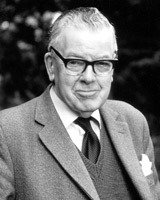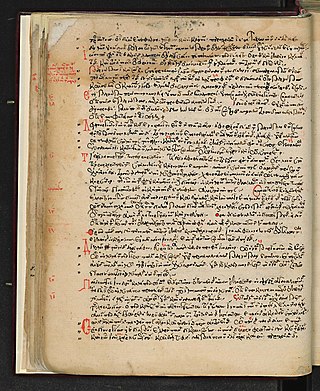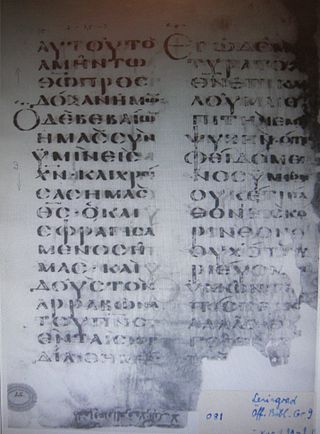
The Epistle to the Philippians is a Pauline epistle of the New Testament of the Christian Bible. The epistle is attributed to Paul the Apostle and Timothy is named with him as co-author or co-sender. The letter is addressed to the Christian church in Philippi. Paul, Timothy, Silas first visited Philippi in Greece (Macedonia) during Paul's second missionary journey from Antioch, which occurred between approximately 50 and 52 AD. In the account of his visit in the Acts of the Apostles, Paul and Silas are accused of "disturbing the city".

The Epistle to the Colossians is the twelfth book of the New Testament. It was written, according to the text, by Paul the Apostle and Timothy, and addressed to the church in Colossae, a small Phrygian city near Laodicea and approximately 100 miles (160 km) from Ephesus in Asia Minor.

The Epistle to Philemon is one of the books of the Christian New Testament. It is a prison letter, authored by Paul the Apostle, to Philemon, a leader in the Colossian church. It deals with the themes of forgiveness and reconciliation. Paul does not identify himself as an apostle with authority, but as "a prisoner of Jesus Christ", calling Timothy "our brother", and addressing Philemon as "fellow labourer" and "brother". Onesimus, a slave that had departed from his master Philemon, was returning with this epistle wherein Paul asked Philemon to receive him as a "brother beloved".

The Second Epistle to the Thessalonians is a book from the New Testament of the Christian Bible. It is traditionally attributed to Paul the Apostle, with Timothy as a co-author. Modern biblical scholarship is divided on whether the epistle was written by Paul; some scholars believe Paul wrote this epistle, but others reject its authenticity based on what they see as differences in style and theology between this and the First Epistle to the Thessalonians.

An epistle is a writing directed or sent to a person or group of people, usually an elegant and formal didactic letter. The epistle genre of letter-writing was common in ancient Egypt as part of the scribal-school writing curriculum. The letters in the New Testament from Apostles to Christians are usually referred to as epistles. Those traditionally attributed to Paul are known as Pauline epistles and the others as catholic epistles.

The Pauline epistles, also known as Epistles of Paul or Letters of Paul, are the thirteen books of the New Testament attributed to Paul the Apostle, although the authorship of some is in dispute. Among these epistles are some of the earliest extant Christian documents. They provide an insight into the beliefs and controversies of early Christianity. As part of the canon of the New Testament, they are foundational texts for both Christian theology and ethics.
Gordon Donald Fee was an American-Canadian Christian theologian who was an ordained minister of the Assemblies of God (USA). He was professor of New Testament Studies at Regent College in Vancouver, British Columbia, Canada.

The Pauline epistles are the thirteen books in the New Testament traditionally attributed to Paul the Apostle.

Frederick Fyvie Bruce was a Scottish evangelical scholar, author and educator who was Rylands Professor of Biblical Criticism and Exegesis at the University of Manchester from 1959 until 1978 and one of the most influential evangelical scholars of the second half of the twentieth century. When the academic community looked down upon Evangelicals, Bruce demonstrated that a scholar holding evangelical views could do worthwhile academic work. He persuaded Evangelicals that they should not turn their backs on academic methods of Bible study, even if the results might differ from traditional evangelical views. As a result, he has been called the "Dean of Evangelical Scholarship".
Douglas J. Moo is a Reformed New Testament scholar who, after teaching for more than twenty years at Trinity Evangelical Divinity School in Illinois, served as Blanchard Professor of New Testament at the Wheaton College Graduate School from 2000 until his retirement in 2023. He received his Ph.D. at the University of St. Andrews, in St. Andrews, Scotland.

The First Epistle of Clement is a letter addressed to the Christians in the city of Corinth. The work is attributed to Clement I, the fourth bishop of Rome and almost certainly written by him. Based on internal evidence some scholars say the letter was composed some time before AD 70, but the common time given for the epistle's composition is at the end of the reign of Domitian. As the name suggests, a Second Epistle of Clement is known, but this is a later work by a different author.
The New International Greek Testament Commentary is a series of commentaries in English on the text of the New Testament in Greek. It is published by the William B. Eerdmans Publishing Company. The current series editors are Todd D. Still and Mark Goodacre.
Minuscule 103, ΟΘ28 (Soden), is a Greek minuscule manuscript of the New Testament, on parchment leaves. Palaeographically it has been assigned to the 12th century. The manuscript has complex contents.

Minuscule 455, ΟΘ 41, is a Greek minuscule manuscript of the New Testament, on paper. Palaeographically it has been assigned to the 13th or 14th century. Formerly it was labelled by 85a and 95p.
Homer Austin Kent, Jr. taught from 1949 to 1999 at Grace Theological Seminary and Grace College in Winona Lake, IN. While there he taught New Testament and Greek and was Dean of the Seminary from 1962 to 1976 when he became President of Grace College and Seminary until 1986. He has also taught around the world in Israel, France, Central African Republic, Hungary and around the U.S. Not only is he an educator, but he is also authored many books and Bible commentaries.
Ralph Philip Martin was a British New Testament scholar.

2 Corinthians 1 is the first chapter of the Second Epistle to the Corinthians in the New Testament of the Christian Bible. It is authored by Paul the Apostle and Timothy in Macedonia in 55–56 CE.
Peter Thomas O'Brien is an Australian clergyman, missionary and New Testament scholar. He has written commentaries on Ephesians, Philippians, Colossians, Philemon, and Hebrews as well as books and articles on aspects of the thought the apostle Paul.
The Pillar New Testament Commentary is a series of commentaries in English on the New Testament. It is published by the William B. Eerdmans Publishing Company.
Tyndale New Testament Commentaries is a series of commentaries in English on the New Testament. It is published by the Inter-Varsity Press.






